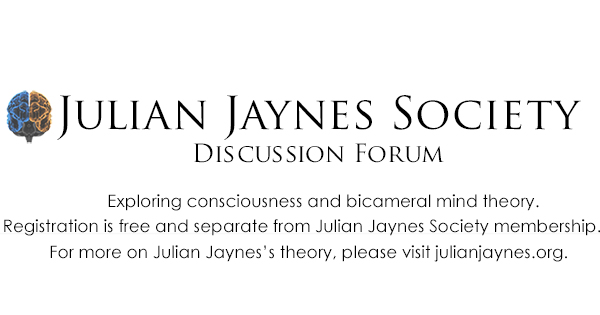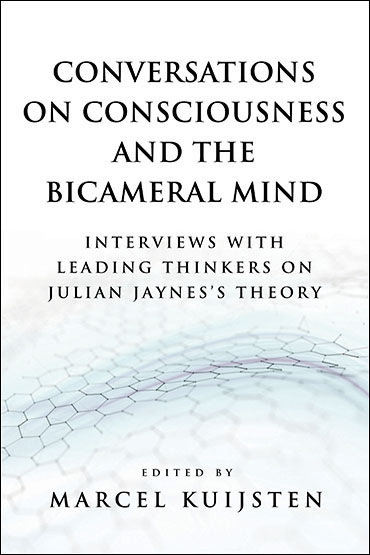I am reading "The Trial of Socrates" by I. F. Stone and find it interesting that Socrates' views are so similar to bicameral man's and that at the same time (400 BC) many other philosophers had views that are similar to post-bicameral man. At the end of chapter 3 Stone states, "So we conclude our first point in demonstrating the fundamental philosophical divergences between Socrates and Athen. He and his disciples saw the human community as a herd that had to be ruled by a king or kings, as sheep by a shepherd. The Athenians, on the other hand, believed - as Aristotle later said - that man was 'a political animal,' endowed unlike the other animals with logos, or reason, and thus capable of distinguishing good from evil and governing himself in a polis. This was no trivial difference."
Just as Julian Jaynes found similar differences in the Iliad and Odyssey, I find it interesting that both ways of "thinking" possibly existed at the same time in ancient Greece. I'm wondering if anyone in this forum has a similar view.
Socrates vs. Aristotle - Which One Was Bicameral?
-
rnonemaker
- Posts: 3
- Joined: Sun May 03, 2009 11:58 am
Re: Socrates vs. Aristotle - Which One Was Bicameral?
Yes, and even more to the point, Socrates had what he called a daimon, or "divine guide" — a hallucinated voice that deterred him from taking certain actions.
Socrates:
"The favor of the gods has given me a marvelous gift, which has never left me since my childhood. It is a voice which, when it makes itself heard, deters me from what I am about to do and never urges me on."
Socrates may have been an early transitional figure, a fully conscious person still experiencing active auditory hallucinations.
David Stove discusses this further in Reflections on the Dawn of Consciousness (p. 274).
Socrates:
"The favor of the gods has given me a marvelous gift, which has never left me since my childhood. It is a voice which, when it makes itself heard, deters me from what I am about to do and never urges me on."
Socrates may have been an early transitional figure, a fully conscious person still experiencing active auditory hallucinations.
David Stove discusses this further in Reflections on the Dawn of Consciousness (p. 274).
Re: Socrates vs. Aristotle - Which One Was Bicameral?
Aren't there stories where Socrates had intensive internal discourse with this internal voice to the point of that he would remain rooted to the spot for an entire day, transfixed, unmoved, heeding his 'daimonic sign'?
And in line with Jaynes' theory that bicameral man possessed immense strength and stamina Socrates was noted to have these qualities in abundance when a soldier. His physical gifts were noted to be some way above those around him. Particularly stamina if I remember correctly.
And in line with Jaynes' theory that bicameral man possessed immense strength and stamina Socrates was noted to have these qualities in abundance when a soldier. His physical gifts were noted to be some way above those around him. Particularly stamina if I remember correctly.
-
ETSubmariner
- Posts: 8
- Joined: Wed Aug 20, 2014 1:14 pm
- Location: Seattle Washington
Re: Socrates vs. Aristotle - Which One Was Bicameral?
Although this is quite an old thread, pardon my necromancy, I wanted to recall that almost everything that we know of Socrates was written not by Socrates at all, but by others - Plato Xenophon, others. Can we point to a person and say that is the real Socrates? Such an awareness leaves us with the problem of determining the conscious-level of Plato or Xenophon, and whether their "bright" version of Socrates was equal to the man, bicameral or conscious.
I think we can find that Socrates was very probably bicameral or on that side of it. He heard a voice, and Plato/Xenophon wrote that he was very much a prophet of the Sun-God. Might his charge of heresy have been in part because the waking consciousness of Athenians was trying to distance itself from inner voice-authority? If he had espoused the more conscious topics in a more 'normal' way, would the charge have been leveled at all?
When I see a conversation about the charge of heresy against Socrates, I like to reread Apology (Plato). I remember that the city asked Socrates to come to the trial (Plato again), and the city wanted him to avoid being found guilty of heresy (Plato again); without Plato describing the trial from a more conscious mind, would we read about the city acting 'conscious' at all? If we allow Plato to be bicameral and able to write at length simultaneously, would Apology be just a factual timeline of events rather than text/story?
We read that Socrates felt a person should attend to the city and its laws, and Plato gave several reasons that he felt were relevant as a more conscious author, but if Socrates The Bicameral were indeed bicameral, he would have simply obeyed without all that extra-mentality being discussed. When people dredge up Socrates relating to their modern ideas of freedom and tyranny, they think like a modern conscious mind.
What would Socrates have said about his trial as Socrates The Bicameral?
I think we can find that Socrates was very probably bicameral or on that side of it. He heard a voice, and Plato/Xenophon wrote that he was very much a prophet of the Sun-God. Might his charge of heresy have been in part because the waking consciousness of Athenians was trying to distance itself from inner voice-authority? If he had espoused the more conscious topics in a more 'normal' way, would the charge have been leveled at all?
When I see a conversation about the charge of heresy against Socrates, I like to reread Apology (Plato). I remember that the city asked Socrates to come to the trial (Plato again), and the city wanted him to avoid being found guilty of heresy (Plato again); without Plato describing the trial from a more conscious mind, would we read about the city acting 'conscious' at all? If we allow Plato to be bicameral and able to write at length simultaneously, would Apology be just a factual timeline of events rather than text/story?
We read that Socrates felt a person should attend to the city and its laws, and Plato gave several reasons that he felt were relevant as a more conscious author, but if Socrates The Bicameral were indeed bicameral, he would have simply obeyed without all that extra-mentality being discussed. When people dredge up Socrates relating to their modern ideas of freedom and tyranny, they think like a modern conscious mind.
What would Socrates have said about his trial as Socrates The Bicameral?
Kenneth Pfaff
Head Librarian, The Grotto Library
Head Librarian, The Grotto Library


